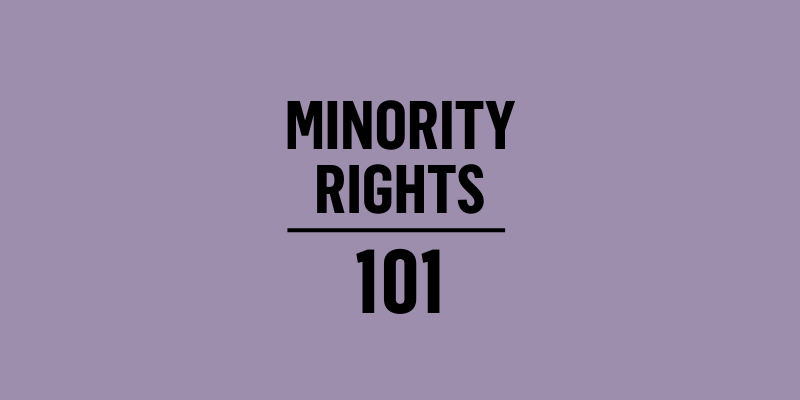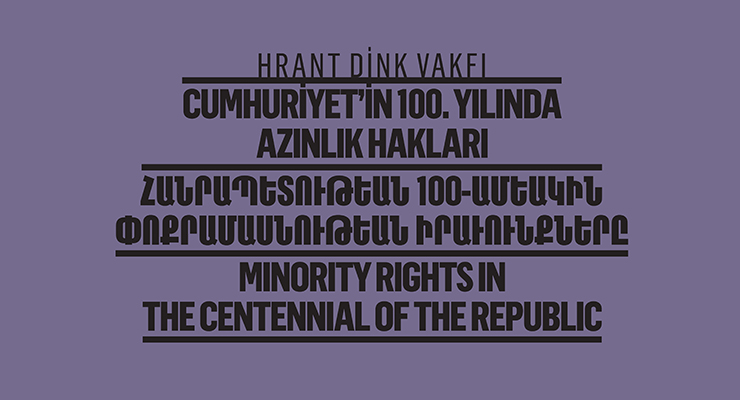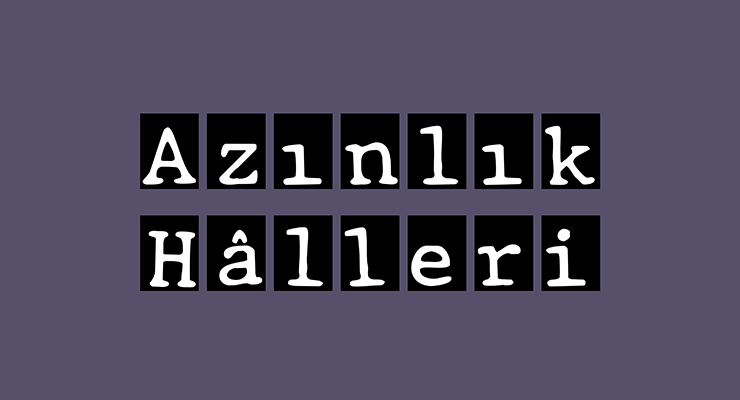As the Hrant Dink Foundation, we continue to conduct projects that address and examine minority rights and the challenges minorities face. We recently marked the 100th anniversary of the signing of the Treaty of Lausanne. Although the protection of minorities was internationally guaranteed under the treaty, what kind of problems have minorities continued to face over the past century? Do they encounter obstacles in exercising their rights? What are the new discussions concerning minorities? On this occasion, we wanted to share with you the work we have done in the field of minority rights. We hope this will serve as a valuable resource for those interested in or starting to learn about this topic and that increased awareness will strengthen coexistence.
AZINLIK HÂLLERİ PODCAST SERIES
In the ‘Azınlık Hâlleri’ podcast series, we discuss minority rights policies, issues, and solutions both within and outside of Turkey. Our conversations with experts in the field serve as a comprehensive educational resource. We explore topics such as the definition of minority with Samim Akgönül, minority rights in international law with Olgun Akbulut, minority rights and challenges in Western European countries with Elçin Aktoprak, the scope of minority rights and violations under the Treaty of Lausanne with Baskın Oran, minority rights in Turkey within the context of human rights law with Turgut Tarhanlı, minorities in the educational curriculum with Kenan Çayır, freedom of religion, belief, and conscience in international and national law with Mine Yıldırım, and Armenian institutions and their challenges with Ohannes Kılıçdağı. You can access the episodes here. Our podcast series will continue; if you have topic suggestions or guest recommendations, please email us at This email address is being protected from spambots. You need JavaScript enabled to view it..

TIGHT OUTFIT
The report titled ‘Tight Outfit: Armenian Institutions in Turkey, Problems and Solution’ addresses the challenges faced by the Armenian community in Turkey and offers solutions to these challenges. Published last year, this report provides a clearer picture of whether the state has fulfilled its negative and positive obligations towards minority groups defined under the Treaty of Lausanne. Prepared by Ohannes Kılıçdağı and Nesrin Uçarlar, the study focuses on the problems experienced by the Armenian community, particularly concerning educational institutions, foundations, and religious institutions. It also questions the systematic discrimination and racism directed at Armenians and other minorities as the underlying root of these issues. By focusing on the violations of the Armenian community's rights to association, education, and religious freedom, the study discusses the legal, political, and social steps that can be taken to resolve these problems, as well as the role of civil society. This work offers insights into the steps that can be taken not only to protect the rights of the Armenian community but also to safeguard the rights of all minorities in Turkey.

MINORITY RIGHTS CONFERENCE
At the conference titled ‘Minority Rights in the Centennial of the Republic’, academics from various disciplines shared their research on the rights minorities have held and the challenges they have faced over the past century. The conference featured twenty four presentations under the following session titles: ‘Conceptual Framework and Protection of Minorities’, ‘Minorities and the Treaty of Lausanne’, ‘Identity and Recognition’, ‘Exile, Return, and Dispossession’, ‘Cultural Heritage, Memory, and Property’, ‘Identity, Belonging, and Exclusion’, ‘Minorities at the Margins’, and ‘Religion, Faith, and Minorities’. You can access the conference presentations here.
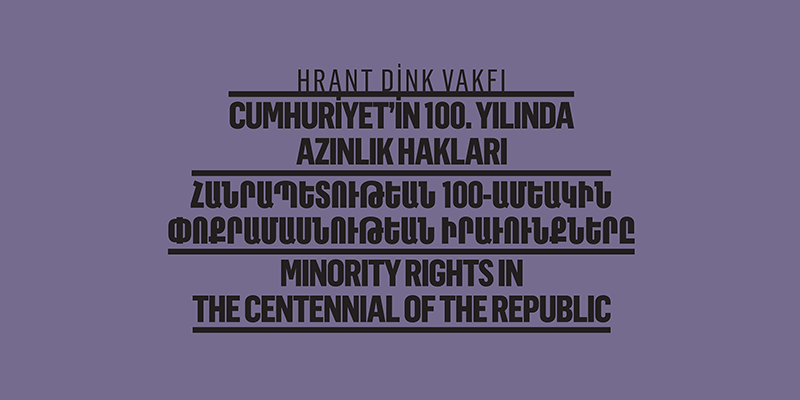
HDV MINORITY RIGHTS ACADEMY
With the support of the European Union, we established the HDV Minority Rights Academy this year, and the first term of the program began in June. Twenty participants from different regions of Turkey attended the four-day program, where they had the opportunity to learn about the scope of minority rights, Turkey's practices, examples from other countries, and advocacy strategies from academic experts in the field, both from Turkey and abroad. You can access the academy's content and program here. We will announce the second term of the academy in the coming months.
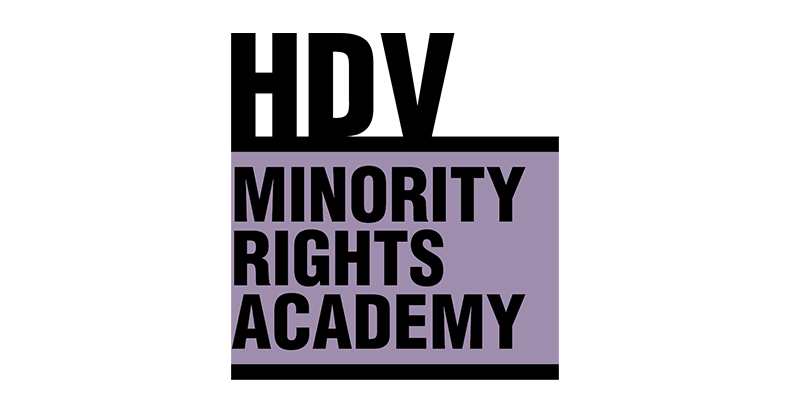
HATE SPEECH
The Lausanne minorities have been at the forefront as ‘historical others’ in our hate speech monitoring work we have been conducting since 2009. We believe that recognizing the manifestations of discrimination in language that minorities encounter in everyday life, is the first step in combating discrimination. For those interested in further reading on this topic, we recommend the books Media and Hate Speech: Concepts, Outlets, Discussions and Media and Hate Speech: Perennial Questions, Current Debates.
2012 DECLARATION
The 1936 Declaration is one of the most significant issues that the Lausanne minorities in Turkey have faced and continue to face today. Originally intended to document the properties owned by minority foundations, the implementation of this declaration became a tool to seize their properties. The most comprehensive study on this topic, detailing its historical, political, and legal aspects, is the book 2012 Declaration: The Seized Properties of Istanbul Armenian Foundations, which you can read by clicking here.
WERE THERE MINORITIES IN YOUR HOMETOWN?
When considering various censuses, it is believed that in the late Ottoman period, before the Treaty of Lausanne, approximately 1.5 million Armenians, 2 million Greeks, 500,000 Syriacs, and 200,000 Jews lived in the region. Today, the estimated numbers are around 50,000 Armenians, 20,000 Syriacs, 17,000 Jews, and 2,000 Greeks living in Turkey. If you are curious whether there were minorities in your hometown, you can trace their presence with the Hrant Dink Foundation's Turkey Cultural Heritage Map. The map features over 10,000 sites such as schools, churches, and synagogues belonging to Lausanne minorities, allowing you to search for information related to the area where you live. If you have any information or photos regarding the current state of these structures, you can contact us at This email address is being protected from spambots. You need JavaScript enabled to view it..

This project is financed by the European Union.

